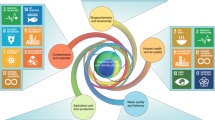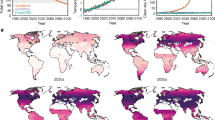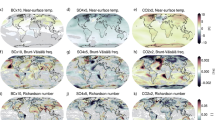Abstract
MANY anthropogenic threats to the ozone layer have surfaced (eight so far) since McDonald first suggested that supersonic transport aircraft would lead to increased skin cancer. It should be comforting, therefore, that agricultural modifications to the Earth (increased oxygenation, drainage, and pH of the soil and destruction of bacteria culturing humus) are suggested here to be more important than addition of fixed nitrogen in modifying N2O production by denitrifying bacteria. If true, man should have caused an increase in total global ozone.
This is a preview of subscription content, access via your institution
Access options
Subscribe to this journal
Receive 51 print issues and online access
$199.00 per year
only $3.90 per issue
Buy this article
- Purchase on Springer Link
- Instant access to full article PDF
Prices may be subject to local taxes which are calculated during checkout
Similar content being viewed by others
References
Shapley, S. Science 195, 658 (1977).
Johnston, H. S. Science 195, 1280 (1977); J. Geophys. Res. 82, 1711 (1977).
Russell, E. W. in Soil Conditions and Plant Growth 10th edn (Longman, New York, 1973).
McElroy, M. B. Int. Rev. Sci. 9, 127–211 (1976).
Pierotti, D. & Rasmussen, R. A. Jt Symp. Non-Urban Tropospheric Composition, Hollywood (1976).
Author information
Authors and Affiliations
Rights and permissions
About this article
Cite this article
ELLSAESSER, H. Has man increased stratospheric ozone?. Nature 270, 592–593 (1977). https://doi.org/10.1038/270592a0
Received:
Accepted:
Issue Date:
DOI: https://doi.org/10.1038/270592a0
Comments
By submitting a comment you agree to abide by our Terms and Community Guidelines. If you find something abusive or that does not comply with our terms or guidelines please flag it as inappropriate.



